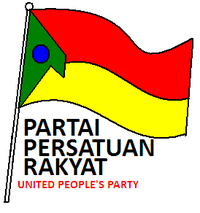United People's Party
United People's Party Partai Persatuan Rakyat | |
|---|---|
 | |
| Chairman | Farhan Abbas |
| Founded | June 2011 |
| Dissolved | August 2012 (de facto) January 2013 (de jure) |
| Merger of | United Republican Party Peoples Social Party Islamic Party of Indokistan |
| Headquarters | Jumstraad |
| Membership (2011) | 12 |
| Ideology | Social democracy Big tent Nationalism (minority) Islamism (minority) |
| Political position | Centre-left |
| Colors | Red |
United People's Party (Indonesian: Partai Persatuan Rakyat) was a former political party in Indokistan established in June 2011 as results of merging between Peoples Social Party, United Republican Party, and Islamic Party of Indokistan. Formation of this party started the second single-party era inside Indokistan, which ended only after Bobodolands-based Islamic Development Party was established in June 2012.
The party was a catch-all party, remembering on the diverse political ideologies of its component parties, which also includes right-wing nationalism and islamism. Despite of its political diversity, the official ideology of the party was set on centre-left ideals, particularly social democracy. The party never had any political influence inside Indokistan, and was neglected by its members following the establishment of Emergency Government in August 2012, and its dissolution was only recognised in early 2013.
History
Aspiration to form a single political party was motivated on issues that plagued Indokistani party politics, including the annulment of the results of the 2011 parliamentary election because of protests alleging government bias. A grand coalition formed by United Republican Party and Peoples Social Party inside the Farhangrad Parliament, despite providing a strong government legitimation, was seen with unease by citizens. The only opposition Islamic Party of Indokistan was virtually ineffective since it could not yield any influence from other parliamentarians.
The situation was critisized by president Farhan Abbas that sees political parties as a symbol of division among Indokistani society, while also acknowledged the necessity to satisfy Indokistani islamist that was always marginalised inside the government. Farhan later suggest that all political parties should unite and merge and form a single political party. His suggestion was later accepted by party leaders, which immediately convened to sign an agreement to merge their political parties. After deliberations, it was agreed that the new name for the party should be "United People's Party", as suggested by prime minister Mustafa Hakim, which also designed the new party logo. The new party was relaunched in June 2011, and started the second single-party era in Indokistan.
Throughout its existence, the party never had any significant influence outside the parliament, as Indokistani political activism at that time was still run on personal influence rather of among party lines. During 2011 presidential election, despite that all three candidates were member of the party, they all run as independents without showing their allegiance to their party, further revealing the weaknesses of Indokistani party politics.
Criticism
Establishment of the party resulting on single-party politics in Indokistan which resulting on mixed reactions among micronationalists, beside on the impression that Indokistan would be turned an autocratic state. One of the most notable criticism was came from a Los Bay Petrosian Nasakom Party member, comparing Indokistan with North Korea and Nazi Germany, and also accused Indokistan to converting itself into an "authoritarian and facsist state" that was incompatible with the values of Pancasila and socialism, the official ideology of the Nasakom Party.[1] An ultimatum of two months was even set by him for Indokistani government to cancel the party merging.
The criticism was countered by prime minister and party member Mustafa Hakim on November 2011. He argues that the entire process was done voluntarily with no intention to form a dictatorship, and merging political parties was mainly done to avoid existing political parties issue. Mustafa also emphasised that the United People's Party was a true symbol for Indokistan that was united on its political goals.[2]
Dissolution
Never gained any political importance since its establishment, the party was neglected by its own members in early 2012, with the establishment of the Emergency Government in August 2012 sealed any hope for restoration of party activities. Its members never declare the disbandment of their party, and it was officially disbanded only during the Indokistani national reform in early 2013 that brought non-partisan politics to Indokistan.